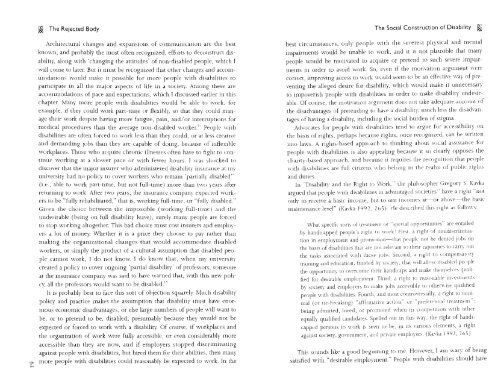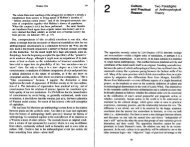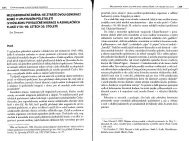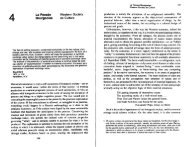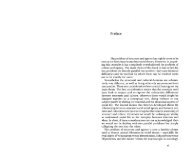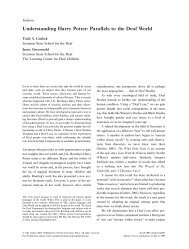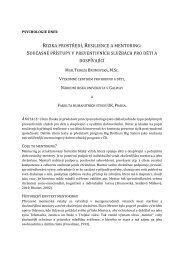The Social Construction of Disability - Moodle
The Social Construction of Disability - Moodle
The Social Construction of Disability - Moodle
Create successful ePaper yourself
Turn your PDF publications into a flip-book with our unique Google optimized e-Paper software.
~ <strong>The</strong> Rejected BodyArchitectural changes and expansions <strong>of</strong> communication are the bestknown, and probably the most <strong>of</strong>ten recognized, efforts to deconstruct disability,along with .changing the attitudes' <strong>of</strong> non-disabled people, which Iwill come to later But it must be recognized that other changes and accommodationswould make it possible for more people with disabilities toparticipate in all the major aspects <strong>of</strong> life in a society. Among these areaccommodations <strong>of</strong> pace and expectations, which I discussed earlier in thischapter. Many more people with disabilities would be able to work, forexample, if they could work part-time or flexibly, so that they could managetheir work despite having more fatigue, pain, and/or interruptions formedical procedures than the average non-disabled worker." People withdisabilities are <strong>of</strong>ten forced to work less than they could, or at less creativeand demanding jobs than they are capable <strong>of</strong> doing, because <strong>of</strong> inflexibleworkplaces. Those who acquire chronic illnesses <strong>of</strong>ten have to fight to continueworking at a slower pace or with fewer hours. I was shocked todiscover that the major insurer who administered disability insurance at myuniversity had no policy to cover workers who remain .partially disabled"(i.e., able to work part-time, but not full-time) more than two years afterreturning to work. After two years, the insurance L'CJll1pany expected workersto be "fully rehabilitated," that is, working full-time, or "fully disabled."Given the choice between the impossible (working full-time) and theundesirable (being on full disability leave), surely many people are forcedto stop working altogether. This bad choice must cost insurers and employersa lot <strong>of</strong> money. Whether it is a price they choose to pay rather thanmaking the organizational changes that would accommodate disabledworkers, or Simply the product <strong>of</strong> a cultural assumption that disabled peoplecannot work, I do not know. I do know that, when my universitycreated a policy to cover ongoing 'partial disability' <strong>of</strong> pr<strong>of</strong>essors, someoneat the insurance company was said to have warned that, with this new policy,all the pr<strong>of</strong>essors would want to be disabled. IRIt is probably best to face this sort <strong>of</strong> objection squarely. Much disabilitypolicy and practice makes the assumption that disability must have enormouseconomic disadvantages, or else large numbers <strong>of</strong> people will want tobe, or to pretend to be, disabled, presumably because they would not beexpected or forced to work with a disability. <strong>of</strong> course, if workplaces andthe organization <strong>of</strong> work were fully accessible, or even considerably moreaccessible than they are now, and if employers stopped discriminatingagainst people with disabilities, but hired them for their abilities, then manyo- more people with disabilities could reasonably be expected to work. In the~<strong>The</strong> <strong>Social</strong> <strong>Construction</strong> <strong>of</strong> <strong>Disability</strong> ~best circumstances, only people with the severest physical and mentalimpairments would be unable to work, and it is not plausible that manypeople would be motivated to acquire or pretend to such severe impairmentsin order to avoid work. So, even If the motivation argument wt-recorrect, improving access to work would seem to be an effective way <strong>of</strong> preventingthe alleged desire for disability, which would make it unnecessaryto impoverish people with disabilities in order to make disability undesirable.Of course, the motivation argument does not take adequate account <strong>of</strong>the disadvantages <strong>of</strong> pretending to have a disability, much less the disadvantages<strong>of</strong> having a disability, including the social burden <strong>of</strong> stigmaAdvocates for people with disabilities tend to argue for accessibility onthe basis <strong>of</strong> rights, perhaps because rigbts, once recogmzed, can be writteninto laws. A rights-based approach to thinking about social assistance forpeople with disabilities is also appealing because it so clearly opposes thecharity-based approach, and because it requires the recognitHlll that peoplewith disabilities are full citizens who helong in the rr-ahn <strong>of</strong> pu hlic righlsand dutiesIn "<strong>Disability</strong> and the Right to \Nork," the philosopher Gregory S. Kavkaargued that people with disabilities in advantaged societies" have a right "nutonly to receive a basic income, but to cern incomes at-or above-the basil'maintenance level" (Kavb 1992, 2(5). He described t his righl as Iollows:What specific sorts uf tr.-auneru or "special opporturuues" are entailedby handicapped people's nghl IU work.' First, a right <strong>of</strong> nondiscriminationin employment and prom, )Iiun-that ptupk not be denied Job, 011the basis uf disabihues thai are not relevant 10 their capacitle, to carry outthe tasks associated with those job,. Secund, a nght to coml'ematurytrailllng and education, funded hI' souety, that will allow di,ahkcl pcuplethe opportunity 10 overcome their handicaps and make \hel1l,(~h'e, q\uhfiedfor desirable employment Third, a right to reasonable investmentsby socrety and employers to make Job, accessible \() other» 1St quahtiedpeople wit]: disabilities. Fourth, and most controversially, a right to minima!(or lie-breaking) "afflrmatin' action" ur "preferential ireaun. n;":being admitted, hired, or promoted when in competition with otherequally qualified candIdates. Spelled out in this way, the right <strong>of</strong> handicappedpersollS to work IS seen to he, III Its various elements, a rightagainst society, government, am! private -mplovers. (Kavka ]992, 265)This sounds like a good beginning to me However, I am wary <strong>of</strong> beingsatisfied with "desirable employment" People with disabilities should have


